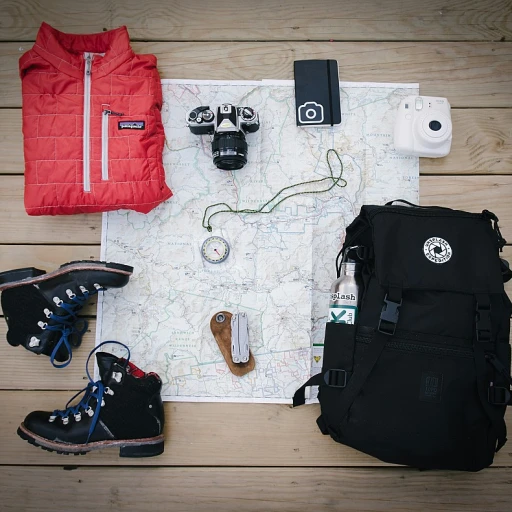Understanding Vegan Walking Shoes
Exploring Vegan-Friendly Materials
With environmental consciousness on the rise, vegan shoes offer a compelling alternative for those seeking sustainable footwear options. Unlike traditional hiking boots that often use leather, vegan walking shoes are crafted from materials that do not involve any animal products. These materials can include synthetic fabrics, recycled components, and plant-based textiles, making them an ethical choice for eco-minded hikers.
While exploring the benefits of vegan hiking footwear, it's essential to highlight how these materials offer both functionality and durability. Vegan boots are designed to be lightweight and highly breathable, an added advantage for intense hiking sessions. Moreover, these shoes often integrate waterproof and insulated features, ensuring protection in various weather conditions.
Despite these benefits, vegan hiking boot manufacturers face challenges in balancing sustainability with performance, especially when competing with established regular hiking options. However, advancements in technology are closing this gap, providing outdoor enthusiasts with vegan hiking shoes that offer comparable levels of support and protection.
The Benefits of Vegan Walking Shoes for Hikers
The Advantages for Outdoor Enthusiasts
When it comes to choosing hiking boots, vegan options provide several compelling advantages for outdoor enthusiasts. While traditional leather boots have long dominated the market, vegan hiking shoes are quickly gaining traction due to their unique benefits.
Firstly, vegan walking boots often integrate advanced materials that are both durable and lightweight, making them a comfortable choice for long trail adventures. These materials include recycled components, which help in contributing to a sustainable environment and often result in boots that are breathable and regulate foot temperature effectively.
Moreover, vegan hiking footwear frequently boasts waterproof features, such as those found in renowned brands like WVSport. Waterproof options ensure that hikers can confidently tackle wet and challenging terrains without compromising comfort or safety. The innovative designs provide reliable insulation, thus accommodating a range of weather conditions and making them a versatile choice for both summer hikes and winter treks.
Vegan boots also present a diverse selection to cater to individual preferences and budgets. Available for both men and women, these boots often come in a variety of styles and functional options, from insulated boots perfect for winter outings to lightweight trail shoes for summer expeditions. The price range is equally varied, allowing hikers to find products at regular prices or take advantage of sale offers that provide excellent value.
Lastly, the quality and performance of these footwear choices are often on par with their leather counterparts. For outdoor enthusiasts looking for non-leather alternatives that do not compromise on performance, vegan hiking boots may very well represent the best choice available today, providing the reliability and comfort needed on any hiking trail. To explore more options, you can read about top winter boot selections for men, which may also offer further insights into the variety and performance of vegan hiking footwear.
Challenges in Designing Vegan Hiking Boots
Crafting Vegan Hiking Footwear with Performance in Mind
Designing vegan hiking boots that can stand up to the challenges of the trail presents unique obstacles that are quite different from those encountered with traditional leather boots. Vegan shoes lack the natural durability and water resistance of leather, requiring innovative materials to fill the gap while maintaining environmental and ethical benefits. The use of premium synthetic materials, such as recycled fibers and advanced polymers, has enabled manufacturers to produce lightweight, durable options that do not compromise on performance. These materials must be precisely engineered to offer waterproof and insulated properties (like those found in wvsport waterproof or insulated designs) on par with traditional leather hiking shoes. Integrating breathable membranes, such as GTX technology, plays a critical role in ensuring that these boots remain comfortable during extended periods of use, whether trekking through damp landscapes or traversing sun-baked trails. However, creating a product that caters to both technical performance and sustainable ethics often results in regular price points that differ from boots at a price sale. Balancing cost with sustainability and performance is a careful dance that brands engage in to deliver the best experience for vegan hiking enthusiasts. Consumers are increasingly demanding vegan options that come with unit prices reflective of their premium design and eco-friendly makeup. Both men and women can find options in waterproof, insulated, or even wvsport specialized units to suit a range of hiking conditions without compromising on style or function. With the rising demand for vegan footwear, continued research and development are essential in delivering boots that not only meet the rigorous expectations of outdoor enthusiasts but also maintain an ethical stance. As we compare the evolution of vegan hiking boots with their traditional counterparts, it becomes clear that the path forward involves innovation and ethical production practices dynamic and static rope for top rope solo climbing.Comparing Vegan and Traditional Hiking Boots
Material Composition and Environmental Impact
When comparing vegan and traditional hiking boots, the most significant difference lies in the materials used. Traditional hiking boots often rely on leather, which provides durability and water resistance but involves animal products. In contrast, vegan hiking boots utilize synthetic materials like recycled plastics and innovative textiles, which are designed to be sustainable and cruelty-free. These materials can also be waterproof and insulated, offering similar protection as leather. However, the environmental footprint of producing synthetic materials, though devoid of animal products, can still be significant, depending on the manufacturing processes involved.
Performance and Comfort
Performance is a crucial factor for any hiking enthusiast. Traditional leather boots have long been favored for their rugged durability and natural breathability. Vegan options, however, have made significant strides in recent years. Brands like WVSport offer insulated and waterproof options that cater to both men and women, ensuring comfort on various trails. The challenge remains in matching the natural breathability of leather, but many vegan boots now incorporate advanced ventilation technologies to enhance comfort during long hikes.
Price Considerations
Price is another critical aspect when choosing between vegan and regular hiking boots. Vegan hiking shoes can sometimes be priced higher due to the cost of innovative materials and sustainable production practices. However, price options vary widely, with some brands offering competitive sale prices. It's essential to weigh the initial cost against the longevity and ethical considerations of the product. Regular price options for traditional boots might be lower, but the ethical and environmental benefits of vegan boots can justify the investment for eco-conscious hikers.
Durability and Longevity
Durability is a common concern among hikers. Traditional leather boots are renowned for their long lifespan, often lasting several years with proper care. Vegan boots, while advancing in durability, may not yet consistently match the longevity of leather. However, the best vegan hiking boots are now designed with reinforced soles and high-quality stitching, aiming to provide a long-lasting unit that can withstand tough terrains. As technology advances, the gap in durability between vegan and traditional boots continues to narrow.
Top Vegan Walking Shoes for Outdoor Enthusiasts
Must-Have Vegan Hiking Boots
Vegan hiking boots have carved a niche in the outdoor enthusiasts' market, offering both eco-friendliness and functionality. With a variety of options available, selecting the best vegan walking shoes can make your trails more sustainable yet comfortable.- WVSport Waterproof: Known for its durability, the WVSport waterproof boots provide excellent protection against wet conditions, perfect for hiking during rainy seasons. They are designed with high-quality synthetic materials to ensure no compromise in performance compared to traditional leather boots.
- GTX Trail Boots: If you're looking for exemplary versatility, the GTX trail options stand out. Not only are they completely vegan, but they also embody features like breathability and waterproofing, which are essential for longer hikes. Their recycled components make them a sustainable choice for environmentally conscious hikers.
- Insulated Boots: When it comes to cold weather hiking, insulated waterproof shoes are a must. Vegan insulated options offer similar warmth and comfort as their leather counterparts, making them ideal for those chilling winter walks. Always check the unit price to ensure you're getting the best insulated boots for your needs.
- Affordable Price Options: Vegan hiking boots don't always come at a high price. Many brands offer quality vegan shoes at a sale price, making eco-friendly choices accessible to all outdoor lovers. It's important to compare price units across brands to find the best deals while not compromising on the essential features.
- Gender-specific Styles: There's an increasing demand for both men and women-specific options in vegan hiking boots. From regular to wvsport insulated designs, there's no shortage of styles tailored to fit different needs, ensuring comfort and a great fit for everyone.
Future Trends in Vegan Hiking Footwear
Anticipating the Evolution of Vegan Hiking Footwear
The future of vegan hiking boots is an exciting frontier teeming with potential innovations and advancements. As consumer demand for ethical and environmentally friendly products continues to rise, manufacturers are pushed to explore cutting-edge technologies and materials. Let's delve into what the future might hold for vegan walking shoes.- Innovative Materials: We've already seen a shift from traditional leather to sustainable alternatives like recycled rubber and synthetic unit components. The future may bring even more eco-friendly options, possibly incorporating biodegradable materials that retain the durability needed for challenging trails.
- Enhanced Durability and Comfort: Future vegan shoes are likely to be more durable and comfortable, competing directly with their traditional counterparts. Brands may focus on crafting soles that are both lightweight and exceptionally strong, enhancing both regular and waterproof hiking experiences.
- Advanced Waterproof and Insulation Technology: While current options like wvsport and insulated waterproof designs lead the pack, future innovations might offer even greater protection against the elements. Developers might streamline the integration of breathable, waterproof gtx membranes, perfecting them for optimal airflow and moisture control.
- Diverse Styles and Sizes: With expanding market options, the variety of styles and sizes for both men and women will increase, allowing outdoor enthusiasts to find the perfect fit. This diversity might drive more competitive price options, making vegan hiking boots accessible to a wider audience.
- Price and Market Trends: As technology evolves, any initial price barriers associated with high-quality vegan options might decrease. This trend, accompanied by regular price adjustments and potential sale price fluctuations, could make vegan hiking shoes more appealing and cost-effective over time.














